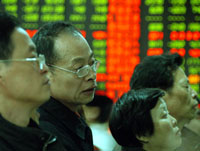USA appears to be hugely dependent on China
The shock wave set off by a plunge in Chinese stocks reflected intense foreign interest in the nation's economic health, but it was jitters over Iran and a possible slowdown in the U.S. economy that turned the drop into a global rout, analysts said Wednesday.

They expressed surprise that the 8.8 percent drop Tuesday in China's markets, which Beijing keeps closed to most foreign investors, could drag down stock prices in New York, Tokyo and elsewhere.
"Markets were on edge, China is the biggest emerging market, something bad happened in China, and that was it," said economist Stephen Green at Standard Chartered Bank in Shanghai.
"But if you look at fundamentally what changed (in China), nothing new happened," he said.
Trouble in emerging markets has wreaked havoc before, setting off the 1997 Asian financial crisis and turmoil in 1998 in Russia and Latin America. And China's economy is increasingly intertwined with the United States, with two-way trade of more than $260 billion last year.
But China's stock market is walled off from the rest of the world, making cross-border reverberations less likely. Rules limit foreigners' purchases of the yuan-denominated stocks that make up the biggest share of China's markets, and capital controls bar them from moving money quickly between China and other markets.
"I don't see a direct link between the markets" in China and abroad, said Qu Hongbin, chief China economist for HSBC Corp. in Hong Kong.
However, experts in the U.S. contend there are a number of connections in which a slide in Chinese stocks would impact Wall Street. Even though it is difficult for foreign investors to penetrate the Chinese markets, there are still 295 stocks from the greater China region that trade on the New York Stock Exchange.
Further, China's growing economy may eventually become the world's largest. The CIA's World Factbook has estimated that China's economy in 2006 ranked third, behind No. 1 U.S., and No. 2 European Union. Any kind of recession in China would have a very real impact on U.S. companies that do business there, or depend on China for goods and services, the AP reports.
The Shanghai stock exchange opened in 1990 and Shenzhen in 1991, after such exchanges were shut by the Communist government in 1949.
They traded unevenly until hitting an especially bearish period with the new millennium. The markets fell for five consecutive years until 2006 -- even though the economy at large was leaping along at a consistent 9-10 per cent gross domestic product growth per year and global share markets were also booming.
During this period, the Shanghai composite index fell 50 per cent and the total capitalisation of the stock market a year ago stood at just 30 per cent of annual GDP, compared with the US ratio of 110 per cent and Japan's of 70 per cent.
Suddenly, last year the markets soared after the Government -- which controls the great majority of all listed companies -- converted most of its formerly non-tradable shares into equity that can be traded, removing a threatening overhang, news.com.au reports.
Source: agencies
Prepared by Alexander Timoshik
Pravda.ru
Subscribe to Pravda.Ru Telegram channel, Facebook, RSS!





